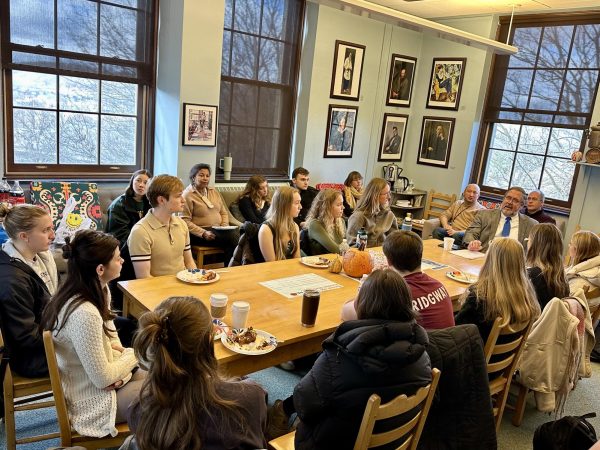Moran Enlightens on Ebola Crisis at Brown Bag
On Thursday, February 12, Professor of Anthropology and Africana and Latin American Studies Mary Moran addressed the misconceptions surrounding the Ebola crisis and tried to help people better understand it during a Brown Bag she hosted in the Africana Latin Asian Native American Cultural Center (ALANA).
This past year, rumors and misinformation about the Ebola crisis have spread, with the first reported cases last March. The audience for the lecture consisted of interested students as well as members of Colgate’s Model African Union, which will be traveling to Washington, D.C., this week to participate in a Model African Union Conference.
This is the ninth year that Moran will take Colgate’s Model African Union to D.C. Colgate has been participating in the Conference since the mid-1990’s, and the Model African Union has been a half-credit course since 2010.
The Conference centers on a crisis, and this will be the first time in several years that the crisis will be a disease rather than a conflict. Moran used the Brown Bag as an opportunity to educate students on how the media has misconstrued the Ebola crisis.
“The U.S. media have represented the Ebola outbreak through the common ‘tropes’ or conventional images of Africa as the dark, dangerous, unknowable home of disease and disaster. It’s rather like filtering every story about the state of Connecticut through the horror of the Sandy Hook shootings,” Moran said.
“The Brown Bag on Ebola was amazing. Not just because of how the Brown Bag was presented by Professor Moran, but also because the facts and information surrounding the disease have been lack[ing] when I’ve looked at mainstream media,” member of the Model African Union senior Greg White said.
Moran lectured with slides that provided information about where in Africa Ebola cases have been reported and statistics on how many people have died from Ebola.
“I think the most important message I’ve learned from the Ebola crisis is that, in order to be informed, people have to research the facts for themselves, not just let the news tell them everything,” White said. “I’ve learned that even though Ebola is very dangerous, the disease has caused the continent of Africa, and perhaps the world, to realize that healthcare is an important issue that doesn’t get enough attention and improvement.”
Moran emphasized that one of the biggest take-aways from the crisis has been that much of the world needs to improve its healthcare, and it needs to do so soon.
“I guess there isn’t a single message we can take from how this has played out, but many. Certainly one important one is that the next time the international community takes responsibility for restructuring countries that have been torn by internal conflict, they should prioritize a basic public health infrastructure,” Moran said.
Another first-year student in attendance at the event expressed her interest, commenting on Moran’s lecture.
“I thought it was interesting how she was saying the first Ebola wave may have been just the beginning and that we may be in the eye of the storm, and that there may be a second wave as far as the Ebola crisis goes. Especially with the harvest coming up, more people are traveling, things like that,” first-year Claudia Pena said.





